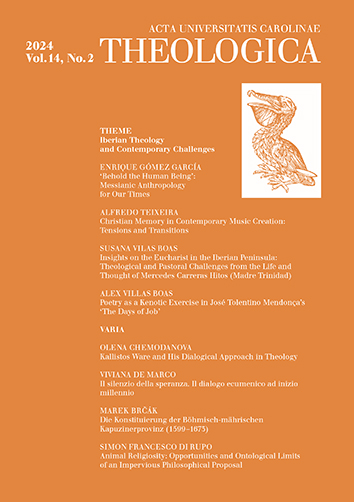AUC Theologica je recenzovaný odborný teologický časopis, který vychází dvakrát ročně. S výjimkou slavistických témat, recenzí a zpráv zveřejňuje příspěvky pouze ve světových jazycích – v angličtině, němčině, francouzštině a italštině.
Časopis se zaměřuje na širokou škálu teologických disciplín, jako je například systematická teologie, biblistika, patristika, pastorální a spirituální teologie, katechetika nebo církevní historie. V rámci nich se snaží reflektovat současná témata, která často vyžadují interdisciplinární přístup. Vítáme také teologické články, které se dotýkají jiných akademických oborů, jako je například filosofie, sociologie, literární věda či vědy přírodní.
Každé číslo se skládá ze dvou sekcí. Tematická sekce obsahuje články s jednotným zaměřením. V sekci s názvem „Varia“ publikujeme původní studie na různá aktuální teologická témata. Všechna čísla časopisu jsou dostupná v režimu Open Access.
AUC THEOLOGICA, Vol 1 No 1 (2011), 53–66
„Křesťan je především člověk jako každý jiný…“, aneb koncept autonomní morálky v kontextu křesťanské víry Alfonse Auera
[“A Christian is first of all a man just as any other man…” or Alfons Auer’s Concept of Autonomous Morality in the Context of Christian Faith]
Jaroslav Lorman
DOI: https://doi.org/10.14712/23363398.2015.60
zveřejněno: 26. 06. 2020
Abstract
The text reminds us of the infl uential concept of the so-called autonomous morality in the context of Christian faith, which has not been suffi ciently refl ected in Czech catholic theology so far. Alfons Auer (1915–2005), a German moral theologian, is considered to be the author of the concept, which he further elaborated in reaction to the publication of Paul VI’s encyclical Humanae vitae (1968). Auer approaches the questions about the specifi cally theological aspect of Christian morality from the standpoint of philosophical realism; moral theology is predominantly meant in its normative dimension, traditionally based on the theoretical-instructional model of revelation. The fundamental statement of the concept of autonomous morality in the Christian context is that practical reason suffi ces to correctly deduce moral requirements from the order of reality. An authority which would impose moral requirements from the outside and also control them must respect this, even if it were a church authority. Its primary fi eld of interest is the specifi cally Christian conduct, which Auer calls the ethos of salvation (Heilsethos) and which can be roughly defi ned by the commandments of the fi rst table of the Decalogue. The moral requirement which results from the understanding of the sphere of “profane” reality (Weltethos) can be correctly recognized in the light of the communicated reason of every person. On the tradition of biblical texts as well as on the history of Christian theology, Auer demonstrates that God’s people have always been open towards the outside world, whose intellectual and ethical concepts they have critically embraced. A specifi cally Christian approach to the recognized requirements of the secular ethos consists in subjecting them to criticism, integrating all that is acceptable and stimulation in the overall horizon of faith. The concept of autonomous morality has been the topic of a fi ery debate since the 1970s.
klíčová slova: theological ethics; autonomous morality in the Christian context; moral theology

„Křesťan je především člověk jako každý jiný…“, aneb koncept autonomní morálky v kontextu křesťanské víry Alfonse Auera is licensed under a Creative Commons Attribution 4.0 International License.
148 x 210 mm
vychází: 2 x ročně
cena tištěného čísla: 100 Kč
ISSN: 1804-5588
E-ISSN: 2336-3398
